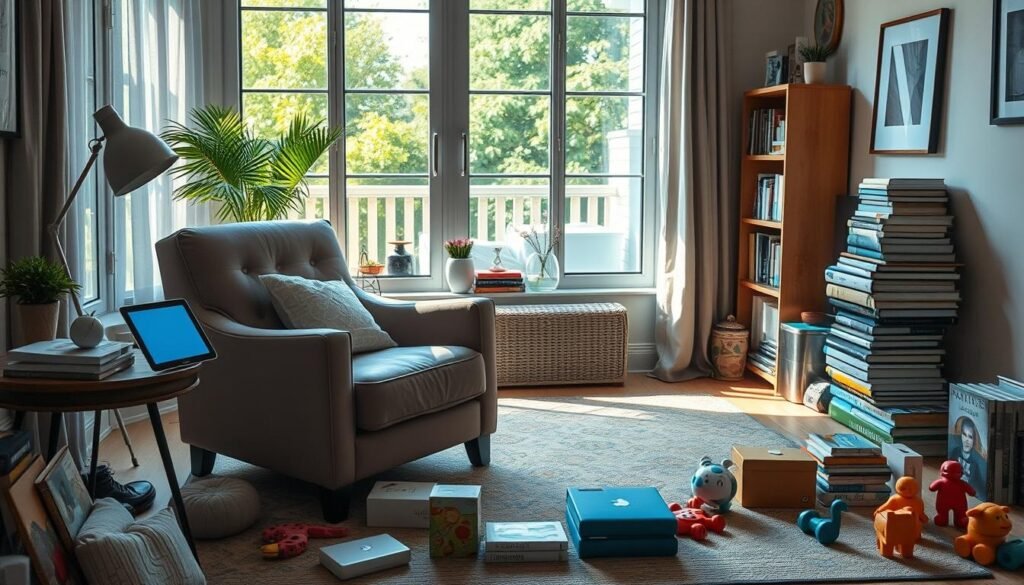Are you curious about armchair parenting and its effects on your child? You’ve probably heard the term but might not know what it means. Armchair parenting is when parents let their kids have more freedom and make their own choices. This can help kids become more independent and self-reliant.
Understanding armchair parenting is key to making good choices for your child. It’s not just about giving kids freedom. It’s about finding the right balance between helping them and letting them grow on their own. A book called “Armchair Parenting: Swapping Judgments for Joy” offers a detailed look at this approach, including its benefits and challenges.
Exploring armchair parenting shows it’s more than just giving kids freedom. It’s about finding a balance between helping and letting them grow. The definition of armchair parenting is complex, and it’s important to grasp it to avoid mistakes. The book “Armchair Parenting: Swapping Judgments for Joy” provides a thorough guide to this parenting style, covering its definition, advantages, and downsides.
Key Takeaways
- Armchair parenting refers to a hands-off approach to parenting, where parents give their children more independence and autonomy.
- The armchair parenting definition is complex and requires a balance between guidance and independence.
- Understanding the concept of armchair parenting is essential to making informed decisions about your child’s development.
- Armchair parenting can be beneficial in promoting independence and self-reliance in children.
- It’s important to find a balance between guidance and independence to avoid pitfalls.
- The armchair parent meaning is often linked to a more relaxed parenting style.
What is Armchair Parenting: Understanding the Basics
Armchair parenting means giving kids more freedom and letting them make their own choices. Parents don’t get involved in every little thing. Instead, they offer advice from afar. This way, kids learn by doing things on their own.
Studies show that armchair parents value independence in their kids1. This method helps kids develop skills like solving problems and making decisions. But, some say it might not provide enough emotional support.
Armchair parents focus on letting kids be independent. They let kids decide things for themselves and don’t interfere much. For example, they might ask kids to do chores to teach them responsibility. You can learn more about this at conscious parenting sites.
Today, armchair parenting has many forms, like minimalist and free-range parenting. Some see it as a way to encourage kids to be self-sufficient. Others might think it’s easier than being a hands-on parent. Think about what’s best for you and your child when deciding on parenting styles.
The Psychology Behind Hands-Off Parenting Approaches
Understanding the psychology of hands-off parenting is key. The debate between armchair and hands-on parenting is ongoing. Some parents choose a relaxed approach, while others are very involved. Research shows that armchair parenting can make children independent but may lack guidance2.
Finding the right balance in armchair parenting is important. It affects how children grow and their future relationships. Parents may struggle to balance giving children freedom and support. This balance is critical for children’s problem-solving skills and learning3.
Here are some key points to consider about armchair parenting:
* It promotes independence and self-reliance
* It can lead to a lack of guidance and support
* Finding the right balance is essential
* It impacts child development and future relationships
Understanding these differences helps parents make better choices about their parenting style4.
| Parenting Style | Effects on Children |
|---|---|
| Armchair Parenting | Promotes independence, potentially leads to lack of guidance |
| Hands-on Parenting | Provides guidance and support, potentially leads to over-involvement |
Successful parenting is about finding a balance between armchair and hands-on approaches. Being aware of each style’s effects on children is key2.
Signs You Might Be an Armchair Parent
Reflecting on your parenting style, you might ask if you’re an armchair parent. This style has both good and bad sides. Knowing the armchair parenting pros and cons helps you make better choices. A key sign is being hands-off, letting your child be independent and make their own choices5.
Another sign is making decisions that put your child’s freedom first. This can be good, but it’s key to balance it right. Armchair parents also focus on teaching kids to be independent and solve problems on their own5.
Common behaviors of armchair parents include:
- Letting children make their own decisions, even if it means making mistakes
- Focusing on independence and autonomy
- Encouraging self-reliance and problem-solving skills
As anarmchair parent role, knowing these signs is important. It helps you adjust your way of parenting to support your child best5.
The Digital Age and the Rise of Armchair Parenting

The digital age has changed how parents raise their kids. Many now use technology to entertain and teach their children. This is known as armchair parenting. About 53% of parents worry about their kids seeing bad stuff online6.
To keep their kids safe, parents use apps and software. In fact, 71% of parents use these tools6.
The debate between armchair and hands-on parenting is growing. Some think armchair parenting helps kids be independent. But others worry it means kids don’t get enough guidance. Kids aged 8-18 spend about 7 hours and 22 minutes a day on screens6.
Finding a balance is key. Parents need to let kids explore online but also protect them.
Some important stats include:
- 60% of teenagers feel “addicted” to their devices6
- 80% of kids see violent content online before they’re 126
- 50% of families use controls on their main routers to manage internet6
Understanding the digital age’s impact on parenting is important. Parents can choose their parenting style wisely. Whether you’re more hands-on or use technology, know the risks and benefits. Always put your child’s safety first6.
| Age Group | Average Screen Time |
|---|---|
| 8-12 years | 4 hours 44 minutes |
| 13-18 years | 7 hours 22 minutes |
Breaking Down the Pros of Armchair Parenting
As a parent, you might know what armchair parenting definition means for your child’s growth. It can help kids become more independent and self-reliant. By giving them tasks and encouraging imagination, parents teach them important life skills1.
Some benefits of armchair parenting include:
- Independence development: Letting kids make their own choices and learn from mistakes makes them more independent.
- Reduced helicopter parenting tendencies: Armchair parenting helps parents step back, letting kids handle things themselves. This reduces overprotection and involvement1.
- Stress management benefits: Not being always involved in kids’ lives can lower parents’ stress and make them feel more at ease1.
Armchair parenting isn’t about being distant or uninvolved. It’s about finding a balance. Parents should give kids freedom to grow while being there to guide and support when needed. Understanding the armchair parenting pros and cons helps parents make better choices. This way, they can create a supportive environment for their children to flourish1.
Potential Pitfalls to Watch For
When you’re into armchair parenting, it’s key to know the downsides. One big worry is not having enough guidance and support. This can make kids feel lost and unsure about facing life’s hurdles. It’s also tough for them to learn how to make smart choices.
Another big risk is that kids might get hurt more often. Studies show babies sleeping on sofas or armchairs are 67 times more likely to get hurt than those in cribs7. This shows how vital it is to keep your child safe, even if it means being more hands-on.
To avoid these problems, try a more balanced way of parenting. Setting clear rules and teaching emotional skills can help kids deal with conflicts better and grow emotionally8. Knowing the risks and taking steps to fix them can help your child grow strong and confident.
It’s also good to think about the armchair parenting critique. It says this style can harm a child’s growth if it goes too far. But, finding a balance between giving freedom and support can help your child grow up well-rounded and strong.
The secret to good armchair parenting is knowing the risks and fixing them. By focusing on safety, setting rules, and teaching emotional skills, you can help your child succeed. As you explore armchair parenting, stay informed, be active, and always put your child’s safety first.
How to Balance Armchair and Active Parenting
Being an armchair parent can be tricky. You want to give your kids freedom but also guide them. It’s key to set boundaries and know when to step in. This way, you help your kids grow independent and self-reliant, which is important for their development9.
It’s also important to build trust by giving your kids space. Letting them make their own choices helps them learn to solve problems and feel confident. As an armchair parent, being there for them while also letting them explore is essential10.
Here are some tips to balance armchair and active parenting:
- Set clear boundaries and expectations
- Encourage independence and self-reliance
- Be available and supportive when needed
- Trust your children to make their own decisions
By following these tips, you can find a balance. This balance combines the freedom of armchair parenting with the support your kids need11.
Impact on Child Development and Future Relationships

Thinking about armchair parenting? It’s key to know how it affects your child’s growth and future connections. The impact of parenting styles on kids is complex. Armchair parenting can have both good and bad effects, depending on how it’s done12.
Armchair parenting can help kids become independent and self-reliant. They learn to solve problems and take responsibility. But, it might also mean they miss out on learning emotional and social skills12.
Some main effects of armchair parenting include:
- Increased independence and self-reliance
- Potential lack of emotional intelligence and social skills
- Influence on future relationships, including romantic partnerships and friendships
When looking at armchair parenting, weigh its pros and cons. Knowing its effects on your child’s growth and future relationships helps you make better choices. This way, you can support your child’s development and well-being13.
Finding a balance is key in armchair parenting. Give your child independence but also offer support and guidance. This helps them grow into a happy, healthy, and well-adjusted person. By being mindful of armchair parenting’s effects, you can help your child succeed in life14.
Tools and Techniques for Effective Armchair Parenting
Being an armchair parent means having the right tools and techniques for your child’s growth and safety. It’s about finding a balance between letting your child be independent and guiding them when needed. According to15, kids need to feel their feelings are real and they are safe. This is key in armchair parenting.
By doing tasks like running errands or folding laundry, you can help your kids prepare for adulthood. You don’t need to expect anything in return15.
Good communication is vital in armchair parenting. You should listen to your child’s concerns and guide them when it’s needed. This includes setting clear rules, praising good behavior, and supporting them when they need it. As16 points out, discipline is about teaching and guiding, which is important in armchair parenting.
Using methods like the H.U.G. process and Story Teaching can help create a positive environment for your child16.
Monitoring your child’s progress is also key in armchair parenting. You should be able to support and guide them as they grow. This can involve using tools like parental control software or setting clear rules. The Peaceful Discipline Parent Coaching Program offers a special approach to parenting, with access to interviews with child development and neuroscience experts17.
By using these tools and techniques, you can create a balanced and supportive environment for your child. This is at the heart of armchair parenting style and definition.
| Tool/Technique | Description |
|---|---|
| Communication | Effective communication with your child, listening to their concerns and providing guidance when needed |
| Monitoring Methods | Using tools like parental control software or setting clear boundaries and expectations to monitor your child’s progress |
| Support Systems | Using programs like the Peaceful Discipline Parent Coaching Program to provide support and guidance |
Common Misconceptions About Armchair Parenting
Exploring armchair parenting, you might find many misconceptions. One is that it’s lazy or neglectful, which is wrong. Actually, it’s a thoughtful way to parent, setting boundaries and letting kids decide for themselves.
Another myth is that armchair parenting means not getting involved. But, it’s not true. Armchair parents are active in their kids’ lives, guiding them when needed. It’s key to look at the armchair parenting critique and the armchair parenting pros and cons to choose your parenting style wisely.
Some common misconceptions about armchair parenting include:
- It’s a lazy approach to parenting
- It’s neglectful and doesn’t provide enough guidance
- It’s only suitable for certain types of children
These myths can stop parents from trying armchair parenting. By learning about it, you can decide what’s best for your kids and give them a great start in life.
Many parents are unsure about armchair parenting because of societal pressure and misconceptions18. But, by looking at the armchair parenting pros and cons and the armchair parenting critique, you can find a parenting style that fits you and your kids.
Conclusion: Finding Your Balance in the Parenting Spectrum
Exploringarmchair parenting shows it’s all about finding a balance. It’s about guiding your kids but also letting them grow on their own19. Psychology has changed, showing us how complex growing up is20.
The digital world has madearmchair parenting more popular. But, using proven methods and talking openly can help your family find its balance21. Online programs can improve how parents and kids interact, making things better21.
It’s important not to be too involved or too distant. Setting boundaries and trusting your kids can help them grow strong while you guide them19.
Parenting is unique for every family. Thearmchair parenting way is about finding what works for you. Be flexible and patient, and your kids will grow up to be confident and strong.
FAQ
What is armchair parenting?
What are the key characteristics of armchair parents?
How does the digital age impact armchair parenting?
What are the benefits of armchair parenting?
What are the pitfalls of armchair parenting?
How can parents balance armchair and active parenting?
How does armchair parenting impact child development and future relationships?
What are common misconceptions about armchair parenting?
Source Links
- The Armchair Parent – Ordinary Times – https://ordinary-times.com/2016/07/06/the-armchair-parent/
- Helicopter vs. Free Range: Endorsement of Parenting Style in the Law – https://finance.yahoo.com/news/helicopter-vs-free-range-endorsement-163002776.html
- The Case for ‘Messy’ Parenting – https://wildculture.com/article/case-messy-parenting/1633
- Armchair Psychology Examples: What YOU Need To Know – https://www.btr.org/armchair-psychology-examples/
- Not everyone you dislike has a mental illness: The problem with armchair psychology, and what to do instead. – IDONTMIND – https://idontmind.com/journal/not-everyone-you-dislike-has-a-mental-illness-the-problem-with-armchair-psychology-and-what-to-do-instead
- Parental Control Software Can Help Alleviate Parenting Stress – Armchair Arcade – https://armchairarcade.com/perspectives/2018/07/24/parental-control-software-can-help-alleviate-parenting-stress/
- It Might Be A Good Idea To Embrace ‘Second Best’ Parenting. Here’s Why. – https://www.huffpost.com/entry/second-best-parenting_l_66be0f42e4b032172d01a0b7
- Gentle Parenting: 5 Important Ways To Know If You’re Using The Real Deal – Dandelion Seeds – https://dandelion-seeds.com/positive-parenting/gentle-parenting-2/
- Gen X parents – A generation that continues to give – https://armchairjournal.com/gen-x-parents-a-generation-that-continues-to-give/
- Parent Coaching: 3 Ways to Create a More Joyful Home – https://www.pregnancymagazine.com/pregnancy/parent-coaching
- Better Fencing Parenting with Maslow – Academy of Fencing Masters – https://academyoffencingmasters.com/blog/better-fencing-parenting-with-maslow/
- The impact of allostatic load on maternal sympathovagal functioning in stressful child contexts: Implications for problematic parenting – https://pmc.ncbi.nlm.nih.gov/articles/PMC3154261/
- The Impact of Parental Separation on their Children – A guide for Parents – https://www.linkedin.com/pulse/impact-parental-separation-children-guide-parents-karl-melvin
- S05|17 – Positive Discipline and Peer-Oriented Attachment – https://www.coachcrystal.ca/blog/s05-e17
- Dr. Becky Kennedy: Protocols For Excellent Parenting & Improving Relationships Of All Kinds | Huberman Lab • Podcast Notes – https://podcastnotes.org/huberman-lab/dr-becky-kennedy-protocols-for-excellent-parenting-improving-relationships-of-all-kinds-huberman-lab/
- Episode 322: Sarah Moore on Peaceful Discipline & Gentle Parenting – https://tiltparenting.com/2023/03/14/peaceful-discipline/
- Peaceful Discipline Parent Coaching Program – https://americanspcc.org/parent-coaching/
- Armchair Parenting: Swapping Judgments for Joy, A Practical Guide to Engaged Parenting – https://books.apple.com/bg/book/armchair-parenting-swapping-judgments-for-joy-a/id6502955316
- Phase 2 (2015) – National Autism Center at May Institute – https://nationalautismcenter.org/national-standards/phase-2-2015/
- Behaviorism is Dead. How Do We Tell The (Autism) Parents? – https://neuroclastic.com/behaviorism-is-dead-how-do-we-tell-the-autism-parents/
- Parent Coaching: 3 Ways To Help The World Heal, Starting With Our Family – Dandelion Seeds – https://dandelion-seeds.com/positive-parenting/parent-coaching/








0 responses to “What is Armchair Parenting? Your Guide to what is armchair parenting”
Could Armchair Parenting be an adaptive response to the pressures of modern life rather than just a hands-off approach?
Interesting read, but dont you think labeling parents as Armchair may lead to unnecessary guilt and self-doubt? Just a thought.
Interesting read! Do you think armchair parenting could actually be beneficial in some scenarios, or is it universally negative?
Interesting read! Does armchair parenting really foster independence, or is it just an excuse for parental negligence? Lets debate this.
I feel armchair parenting might lead to maturity in kids, but does it really foster a deep parent-child bond? Just wondering.